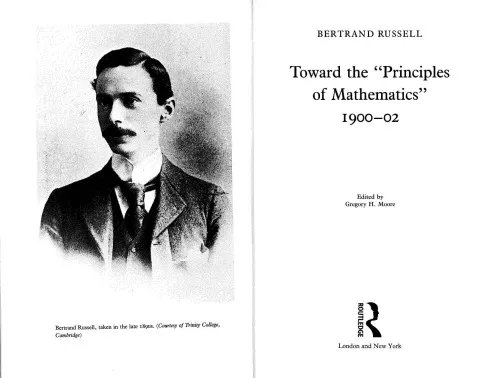Collected Papers, vol. 3: Towards the ’Principles of Mathematics’ 1900-1902
4.8
Reviews from our users

You Can Ask your questions from this book's AI after Login
Each download or ask from book AI costs 2 points. To earn more free points, please visit the Points Guide Page and complete some valuable actions.Introduction to 'Collected Papers, vol. 3: Towards the ’Principles of Mathematics’ 1900-1902'
This volume, part of the celebrated Collected Papers of Bertrand Russell series, offers an intellectual journey into the development of mathematical logic and the philosophical foundations of mathematics as they were shaping my thoughts during the period 1900–1902. It is a mosaic of essays, notes, and letters written in pursuit of clarifying the intricacies of mathematics and logic, eventually culminating in my seminal work, The Principles of Mathematics.
The work presented here reflects not merely a set of inquiries but a decisive period in my intellectual life—a time driven by both challenges and triumphs. It seeks to bridge mathematics and philosophy through logical rigor while answering fundamental questions about the nature of numbers, sets, and truth. As such, this volume remains essential for those seeking to understand my contributions not only to mathematics but also to the broader landscape of analytic philosophy.
Detailed Summary of the Book
The volume compiles a variety of works produced between 1900 and 1902. It is during this period that I confronted and sought to address the foundational problems of mathematics, advocating for a systematic and principled approach inspired largely by formal logic.
Through meticulous essays and detailed analysis, I delve into topics such as the relationship between arithmetic and logic, the role of sets (or classes) in mathematics, and the properties of number theory. Notably, I engage with themes introduced by earlier logicians such as Frege, expanding upon their ideas while responding to emerging challenges—most crucially, the paradoxes that would ultimately inform my later work on type theory.
Key sections also highlight my correspondence with figures like Giuseppe Peano, whose notational system profoundly influenced my thinking. My early attempts to reconcile foundational mathematical principles with logical structure can be observed, paving the way for The Principles of Mathematics, which I published in 1903. These documents together illustrate my unwavering focus on precision, coherence, and the elimination of ambiguity in reasoning.
In essence, the volume captures the evolution of my thought, laying the groundwork for future milestones in both logic and mathematics.
Key Takeaways
- The logical foundations of mathematics are addressed with a depth and rigor that highlights the interdependence of mathematics and philosophy.
- A detailed engagement with logical paradoxes, particularly those involving classes, sets, and membership, underpins the emerging issues that informed my later theories.
- The inspiration drawn from figures such as Frege and Peano is evident throughout, demonstrating the collaborative foundation of intellectual progress.
- The book offers an unparalleled insight into the processes of inquiry and revision that are key to any major intellectual achievement.
- It highlights the importance of formalism, logical syntax, and clarity in navigating the complex issues at the heart of mathematics.
Famous Quotes from the Book
- “The search for logical rigor is not merely an academic exercise but the pursuit of absolute clarity, on which all knowledge must rest.”
- "Mathematics, rightly viewed, possesses not only truth but also supreme beauty—a beauty cold and austere, like that of sculpture."
- “To understand mathematics is to understand not merely numbers and shapes, but the essence of logical order itself.”
Why This Book Matters
The significance of Collected Papers, vol. 3 extends far beyond its context as an introduction to The Principles of Mathematics. It offers an indispensable glimpse into the formation of ideas that have since influenced disciplines ranging from logic and set theory to computer science and philosophy.
For scholars and enthusiasts, this volume showcases the birth of philosophical analysis as it intersects with mathematical formalization. It underscores the central role of logical examination in creating a consistent and universally applicable foundation for mathematics. Moreover, by addressing and attempting to resolve paradoxes early in my career, these works laid the groundwork for the eventual evolution of my contributions to symbolic logic and analytic philosophy.
Above all, it is a testament to the intellectual rigor and dedication required to challenge long-standing assumptions and push the boundaries of knowledge. This volume constitutes a crucial chapter in understanding the trajectory of modern logic and mathematics. It stands as an enduring reflection of the beauty and rigor inherent in intellectual pursuit.
Free Direct Download
You Can Download this book after Login
Accessing books through legal platforms and public libraries not only supports the rights of authors and publishers but also contributes to the sustainability of reading culture. Before downloading, please take a moment to consider these options.
Find this book on other platforms:
WorldCat helps you find books in libraries worldwide.
See ratings, reviews, and discussions on Goodreads.
Find and buy rare or used books on AbeBooks.


